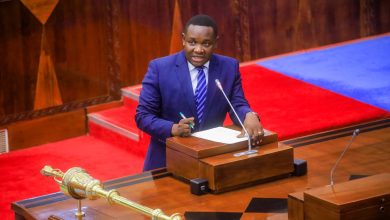Inclusive growth and climate action in Zanzibar

ZANZIBAR: ZANZIBAR government, the United Nations, and partners have started implementing two integrated joint programmes that will advance sustainable development across the islands.
Together, these initiatives aim to empower vulnerable communities, promote women’s economic leadership, and strengthen resilience in the face of climate change.
Strengthening communities through integrated innovations
The Zanzibar Joint Programme (ZJP) (2024–2027), Integrated Innovations for Sustainable Development: Empowering Vulnerable Communities in Kaskazini Unguja and Kaskazini Pemba, is supported by a 3.47 million US dollars (about 8.7bn/-) contribution from the Royal Norwegian Embassy through the Tanzania SDG Acceleration Fund. This is an addition to the existing funds from participating UN organisations.
With a total budget of 8.36 million US dollars (about 20.9bn/-), the ZJP focuses on four critical pillars — human capital strengthening, food systems transformation with an emphasis on climate-resilient value chains, ending violence against women and children; and climate adaptation for coastal populations in low-lying areas.
Currently, three of these pillars are funded, and implementation is underway through the collective engagement of 12 UN organisations including FAO, ILO, IOM, UNCDF, UNDP, UNEP, UNESCO, UNFPA, UNICEF, UNIDO, UN Women, and WHO, working closely with the government ministries and local partners.
This collaborative approach ensures that the programme addresses development challenges in a holistic and integrated manner.
“It is more important than ever that we come together for joint action such as the Zanzibar Joint Programme. It is impressive to see the fruitful ownership and coordination between The Government of Zanzibar, communities, and a wide range of UN organizations.
Norway is a proud donor to the programme. We also acknowledge the key role of the UN Resident Coordinator’s Office in bringing the UN family together in this and other joint programmes,” said Ms Lisa Sivertsen, a representative from the Royal Norwegian Embassy.
Transforming seaweed into a driver of inclusive growth
Building on this foundation, the Joint Programme on Transforming Seaweed Farming through Integrated Financial Solutions, backed by USD 3 million from the Joint SDG Fund, brings together FAO, UNDP, IFAD, and WFP in partnership with the Government of Zanzibar. The programme aims to transition seaweed farming from a subsistence activity into a dynamic and competitive industry that drives food systems transformation and inclusive economic growth.
By 2028, the initiative is expected to benefit 15,000 seaweed farming households, enabling them to increase their incomes by 40 per cent through improved access to finance, stronger cooperatives, and expanded markets. An additional 26 million US dollars (about 50bn/-) is projected to be leveraged from public and private resources, making this one of the most ambitious financing efforts in Zanzibar’s blue economy to date.
An integrated approach
The new seaweed programme complements the ZJP’s food systems transformation pillar, expanding efforts to strengthen value chains by transforming one of Zanzibar’s key export crops into a sustainable driver of livelihoods, women’s empowerment, and blue-economy growth.
“The true measure of progress lies not merely in statistics or reports, but in the tangible improvements in people’s lives,” said Dr. Rahma Mahfoudh, Executive Secretary of the Zanzibar Planning Commission. “Real success will be seen in the young woman in Kaskazini Pemba who acquires new skills to grow her seaweed business, in the child in Unguja who gains access to quality healthcare and nutrition, and in communities that grow more resilient to climate shocks—empowered to shape their own development journey.”
Together, the two programmes reinforce each other and contribute to the Sustainable Development Goals (SDGs), Zanzibar’s Development Vision 2050, and the Zanzibar Development Plan (ZADEP 2021–2026).
Underscoring the importance of strong national leadership and international solidarity, UN Resident Coordinator, Ms Susan Ngongi Namondo said: “The fact that both programmes are coordinated through institutional mechanisms under the Zanzibar Planning Commission (ZPC) is a testament to the government’s commitment to sustainable development.
We are grateful to the Royal Norwegian Embassy and to the UN Joint SDG Fund and all its contributing member states and look forward to continuing to leverage even more resources and partnerships to ensure that these programmes deliver lasting impact for the people of Zanzibar.”
Shared commitment
The announcement of the commencement of these integrated programmes followed a meeting of the Joint Programme Steering Committee (JPSC), cochaired by the Zanzibar Planning Commission and the UN Resident Coordinator, with the participation of heads of UN organisations and officials from the Royal Norwegian Embassy. This body will provide strategic oversight and ensure accountability for the implementation of both joint programmes.
All joint programmes of the Joint SDG Fund are led by UN Resident Coordinators and implemented by the agencies, funds and programmes of the United Nations development system.
ALSO READ: How ZSTHS is mitigating climate change to preserve Zanzibar Stone Town
With sincere appreciation for the contributions from the European Union and Governments of Belgium, Denmark, Germany, Ireland, Italy, Luxembourg, Monaco, The Netherlands, Norway, Poland, Portugal, Republic of Korea, Saudi Arabia, Spain, Sweden, Switzerland and our private sector funding partners, for a transformative movement towards achieving the SDGs by 2030.





